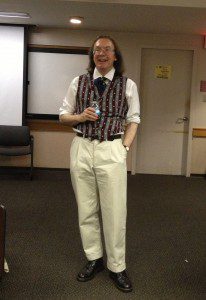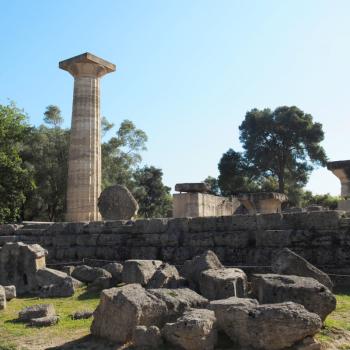
At the risk of sounding like a fanboy (or perhaps, at the risk of exposing myself for the fanboy I am) the primary reason I went to Sacred Lands and Spiritual Landscapes was Ronald Hutton. I’ve respected his work ever since I read The Triumph of the Moon in 2002 and I’ve enjoyed listening to some of his lectures on Druidcast. He doesn’t come across the ocean very often and when I saw he would be in South Carolina I knew I wanted to go.
He did not disappoint. His two talks were both intellectually stimulating and emotionally engaging, despite his first one being given after being up for 42 straight hours due to flight complications. He answered questions, signed books and talked pleasantly with everyone. When part of our dinner group got put into a back room, he came around and visited with us for a while. Ronald Hutton is as good a person as he is a historian.
Professor Hutton’s current research is on the witch hunts and witch trials of the early modern period. He gave us a preview of his findings and while I’m not going to try to summarize his presentation, I do want to highlight a few of his points as they relate to the subject of magic and witchcraft.
Hutton said “we are the only society that both believes in witchcraft and doesn’t believe in it, and I’d like to keep it that way.”
At the core of witch hunts is the human desire for explanations. Something bad happens and we want to know why… and we want to know who to blame. Couple that with the ancient belief in malefic magic and when crops fail, cows go dry, or children die, people go looking for witches. The practice is far from gone – there are hundreds of witch killings in Africa and Asia every year.
Professor Hutton pointed out that in the time of the great witch hunts, there were very few witch executions in the Celtic countries (Scotland was notorious for witch killings, but they were all in the English-influenced border regions, not in the Highlands). When bad things happened, the Scots, Irish and Welsh blamed it on the faeries, not on the neighbors they didn’t like.
Even in our thoroughly (post) modern society, the belief in magic remains. In her presentation, Sara Amis told of a coworker who discovered Sara read Tarot, assumed she was a witch and asked her to work weather magic for her. When people have a need they look for any way to fill it, even if it doesn’t match what the mainstream society labels as “rational.”
 In his second talk, Professor Hutton used the examples of Stonehenge and Lindow Man to show how the absence of proof leads to speculation that may be very wrong. No one knows why Stonehenge was built or what it was used for. There have been many theories over the centuries, some more likely than others, though none conclusive. In 2008 two separate, highly respected and well-funded groups conducted their own research. One came to the conclusion that Stonehenge was a healing temple, an ancient Celtic version of Lourdes. The other said it was a place for the dead that was rarely entered by the living. Is either explanation right? Is either even close?
In his second talk, Professor Hutton used the examples of Stonehenge and Lindow Man to show how the absence of proof leads to speculation that may be very wrong. No one knows why Stonehenge was built or what it was used for. There have been many theories over the centuries, some more likely than others, though none conclusive. In 2008 two separate, highly respected and well-funded groups conducted their own research. One came to the conclusion that Stonehenge was a healing temple, an ancient Celtic version of Lourdes. The other said it was a place for the dead that was rarely entered by the living. Is either explanation right? Is either even close?
Lindow Man is the well-preserved body of a man recovered from a bog in 1984. He was presented by no less an authority than the British Museum as the victim of a human sacrifice from Britain’s pre-Roman days. Yet as Professor Hutton explained (his argument can be found in Blood and Mistletoe, pages 27-28), while that is possible, the evidence is inconclusive. Lindow Man could have been a murder victim or a common execution. And while the dating of the body allows for the possibility Lindow Man died in the pre-Roman era, it’s also possible he died after the Romans left, or at some time during the Roman period.
Who’s right? The only completely accurate answer is We Don’t Know.
You are free to believe Lindow Man was a human sacrifice, or a murder victim, or an executed criminal. That doesn’t mean all interpretations are right. He was only one of those, or possibly something else no one has yet considered. We don’t know and neither do the experts and authorities. In the absence of proof, believe what seems most likely to you and remain open to new evidence and interpretation.
How do magic and witchcraft work? Some magicians insist there are good scientific explanations, or at least there will be once the state of the art of scientific investigation improves in a few generations. Some insist it’s all in your head (although I do love Lon Milo DuQuette’s caveat “you just have no idea how big your head is”). Some say it’s a spiritual operation, the alchemy of changing lead into gold – refining a human into a god. Our fundamentalist detractors say it’s the work of demons out to deceive us. And of course, there are those who say it doesn’t work at all.
Who’s right? Again, the only completely accurate answer is We Don’t Know.
Because there is no definitive explanation of magic and witchcraft we are free to choose the one that is most meaningful and helpful to us. That doesn’t mean any explanation is as good as any other. If we take our craft seriously, we will read and study and practice, and we will write and talk with others. While we will be grounded in tradition, we will change our models and myths as our studies and experiences move us in one direction or another.
Because the mainstream society claims to be rational (though the evidence would strongly indicate otherwise), we are safe to practice magic and witchcraft without fearing that our neighbors will come for us with torches and pitchforks when one of them gets the flu. Although occasionally we come across someone who blames their problems on magical attacks, the law won’t take them seriously and it generally frowns on lynch mobs. I am thankful we live in such a time and place, even as I do my best to re-enchant the world.
Ronald Hutton is right. We are the only society that both believes in witchcraft and doesn’t believe in it, and we need to keep it that way.

















